Author Barbara Dane
The S.S. Vancouver
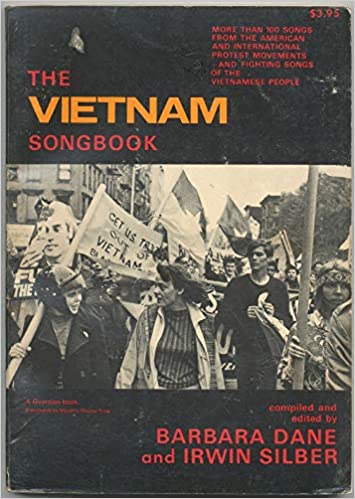
Mansell composed the song "The S.S. Vancouver", although no recording has been identified at the moment. The lyrics of this song featured in The Vietnam Songbook published in 1969, and compiled by Barbara Dane and Irwin Silber (founders of Paredon Records) - containing 100+ Vietnam War protest songs, 9 of which came from Australia & New Zealand.
According to the notes in the book:
"this song was written in 1965 on the arrival of the U.S.S. Vancouver in Australia".
The title dropped the "U", leaving just the "S.S.", a reference to the infamous Nazi paramilitary group. The U.S.S. Vancouver (LPD-2) was an amphibious transport dock, commissioned on 11 May 1963, and deployed at various point in the Vietnam War. In April, 1965, it departed Huế, South Vietnam, having off-loaded marines there. It arrived in Sydney on 1 May 1965, taking part in the The Battle of the Coral Sea commemoration,... (Continues)
According to the notes in the book:
"this song was written in 1965 on the arrival of the U.S.S. Vancouver in Australia".
The title dropped the "U", leaving just the "S.S.", a reference to the infamous Nazi paramilitary group. The U.S.S. Vancouver (LPD-2) was an amphibious transport dock, commissioned on 11 May 1963, and deployed at various point in the Vietnam War. In April, 1965, it departed Huế, South Vietnam, having off-loaded marines there. It arrived in Sydney on 1 May 1965, taking part in the The Battle of the Coral Sea commemoration,... (Continues)
There's commotion at the wharf
(Continues)
(Continues)
2021/11/11 - 22:05
Song Itineraries:
War in Viet Nam as seen from Italy and from the rest of the world
It Isn't Nice
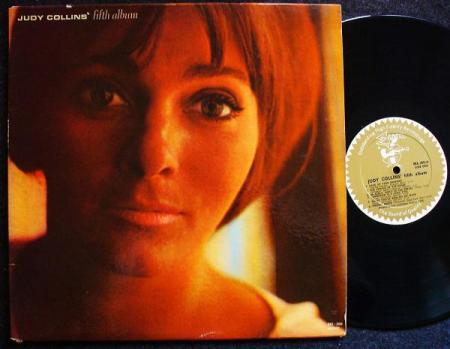
"It Isn't Nice" è stata interpretata anche da Judy Collins, nel suo album del 1965 intitolato "Judy Collins' Fifth Album"
Quella che segue è invece la versione forse più famosa, quella di [[a1324|Barbara Dane] con i Chambers Brothers, 1966.
Quella che segue è invece la versione forse più famosa, quella di [[a1324|Barbara Dane] con i Chambers Brothers, 1966.
IT ISN’T NICE
(Continues)
(Continues)
Contributed by B.B. 2019/10/19 - 23:26
Canción por el fusil y la flor

[196?]
Scritta da Damián Sánchez e Bernardo Palombo
Testo trovato su Cancioneros.com
Interpretata da César Isella nel 1972, nel suo disco “A José Pedroni (El regreso del juglar)”
In seguito dallo stesso autore Bernardo Palombo con il gruppo Cantoclaro nel disco “Argentina: por el fusil y la flor” del 1975 (prodotto da Barbara Dane e dalla Paredon Records)
Sempre nel 1975, la proposero i Canturía nel disco “Chanson pour le fusil et la fleur”
Nel 1977 è la volta di Mercedes Sosa e Gloria Martin nel loro album Si se calla el cantor
“Ascoltami: voglio essere un fiore, ma sennò, sarò un fucile.”
Scritta da Damián Sánchez e Bernardo Palombo
Testo trovato su Cancioneros.com
Interpretata da César Isella nel 1972, nel suo disco “A José Pedroni (El regreso del juglar)”
In seguito dallo stesso autore Bernardo Palombo con il gruppo Cantoclaro nel disco “Argentina: por el fusil y la flor” del 1975 (prodotto da Barbara Dane e dalla Paredon Records)
Sempre nel 1975, la proposero i Canturía nel disco “Chanson pour le fusil et la fleur”
Nel 1977 è la volta di Mercedes Sosa e Gloria Martin nel loro album Si se calla el cantor
“Ascoltami: voglio essere un fiore, ma sennò, sarò un fucile.”
Cuando no sirve la canción
(Continues)
(Continues)
Contributed by Bernart Bartleby 2017/10/18 - 09:05
Song Itineraries:
Argentinian military dictatorship 1976-1982. The desaparecidos
Ramblin' Round
[1941]
Parole di Woody Guthrie
Sulla melodia di "Goodnight, Irene" incisa da Leadbelly nel 1933.
Il brano si trova in parecchie raccolte, a partire da “Columbia River Ballads” (o “Columbia River Collection”)
Interpretata anche da Bob Dylan, Odetta e Barbara Dane.
Testo trovato su woodyguthrie.org
Parole di Woody Guthrie
Sulla melodia di "Goodnight, Irene" incisa da Leadbelly nel 1933.
Il brano si trova in parecchie raccolte, a partire da “Columbia River Ballads” (o “Columbia River Collection”)
Interpretata anche da Bob Dylan, Odetta e Barbara Dane.
Testo trovato su woodyguthrie.org
Ramblin' around your city,
(Continues)
(Continues)
Contributed by Bernart Bartleby 2017/2/19 - 17:25
Song Itineraries:
The War of Labour: Emigration, Immigration, Exploitation, Slavery
Ballad of William White
[1966]
Parole di Katherine Faith Macky (1921-2006), conosciuta come Willow Macky, cantautrice neozelandese
Sulla melodia dell’ottocentesca The Wild Colonial Boy
Canzone inclusa nella prima edizione del “The Vietnam Songbook”, realizzata nel 1969 da Barbara Dane ed Irwin Silber (1925-2010), editore, scrittore, militante socialista e cofondatore “Sing Out!”
Testo trovato sul sito Raymond’s Folk Song Page curato da Raymond Crooke, che di ogni canzone offre anche una sua cover. Pure l’introduzione che segue è sua:
A few days ago I put up a song called "The Ballad of Bill White", by Glen Tomasetti, about an Australian teacher who was jailed as a conscientious objector to the Vietnam war. This is another song about the same story, written by a New Zealander, to the tune of "The Wild Colonial Boy", and published in Barbara Dane's and Irwin Silber's "The Vietnam Songbook" (1969). Macky is quoted... (Continues)
Parole di Katherine Faith Macky (1921-2006), conosciuta come Willow Macky, cantautrice neozelandese
Sulla melodia dell’ottocentesca The Wild Colonial Boy
Canzone inclusa nella prima edizione del “The Vietnam Songbook”, realizzata nel 1969 da Barbara Dane ed Irwin Silber (1925-2010), editore, scrittore, militante socialista e cofondatore “Sing Out!”
Testo trovato sul sito Raymond’s Folk Song Page curato da Raymond Crooke, che di ogni canzone offre anche una sua cover. Pure l’introduzione che segue è sua:
A few days ago I put up a song called "The Ballad of Bill White", by Glen Tomasetti, about an Australian teacher who was jailed as a conscientious objector to the Vietnam war. This is another song about the same story, written by a New Zealander, to the tune of "The Wild Colonial Boy", and published in Barbara Dane's and Irwin Silber's "The Vietnam Songbook" (1969). Macky is quoted... (Continues)
There was a young Australian boy, his name was William White.
(Continues)
(Continues)
Contributed by Bernart Bartleby 2016/2/16 - 15:54
Wild Women Don't Have the Blues
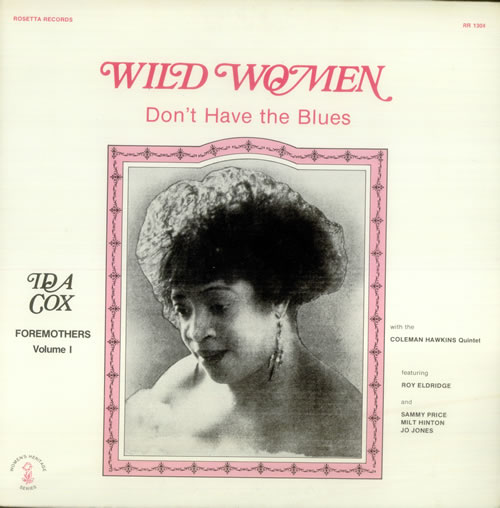
[1924]
in “Ida Cox - Complete Recorded Works, Vol. 2 (1924-1925)”, Document Records.
Ida Cox, la “Regina senza corona del blues”, scrisse nel 1924 questa canzone femminista contro la violenza e la sopraffazione sulle donne diffusissima nella società machista afroamericana. Se pensiamo che Robert Johnson allora era solo un ragazzino e sarebbe diventato il “Re incoronato del blues” cantando spesso della propria propensione, resa incontrollabile dall’alcool, a picchiare le proprie compagne (“I mistreated my baby and I can’t see no reason why”, in “When You Get A Good Friend”, 1936), ci rendiamo perfettamente conto di quanto questa “Wild Women” fosse necessaria ad avanzata per quei tempi…
Meglio essere delle vere donne che stare tutti i giorni a piagnucolare per come gli uomini ci trattano… Le vere donne non sono mai tristi…
Proposta in tantissime cover, da Bessie Smith a Barbara Dane fino a Cyndi Lauper, che l’ha inclusa nel suo più recente album “Memphis Blues”.
in “Ida Cox - Complete Recorded Works, Vol. 2 (1924-1925)”, Document Records.
Ida Cox, la “Regina senza corona del blues”, scrisse nel 1924 questa canzone femminista contro la violenza e la sopraffazione sulle donne diffusissima nella società machista afroamericana. Se pensiamo che Robert Johnson allora era solo un ragazzino e sarebbe diventato il “Re incoronato del blues” cantando spesso della propria propensione, resa incontrollabile dall’alcool, a picchiare le proprie compagne (“I mistreated my baby and I can’t see no reason why”, in “When You Get A Good Friend”, 1936), ci rendiamo perfettamente conto di quanto questa “Wild Women” fosse necessaria ad avanzata per quei tempi…
Meglio essere delle vere donne che stare tutti i giorni a piagnucolare per come gli uomini ci trattano… Le vere donne non sono mai tristi…
Proposta in tantissime cover, da Bessie Smith a Barbara Dane fino a Cyndi Lauper, che l’ha inclusa nel suo più recente album “Memphis Blues”.
I hear these women raving 'bout their monkey men
(Continues)
(Continues)
Contributed by Dead End 2012/8/20 - 11:56
Song Itineraries:
Violence on Women: just like and worse than war
We’ll Never Turn Back
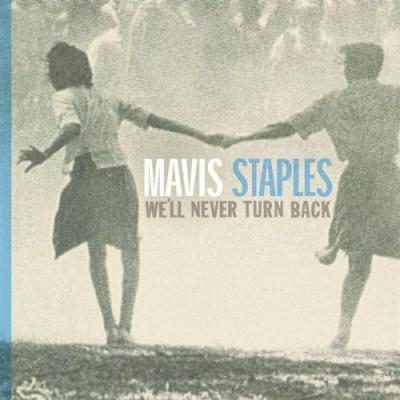
[1961?]
Parole e musica di Bertha Gober
Bertha Gober era all’epoca studentessa all’Università di Albany, Georgia, Attivista dei Freedom Riders e dello Student Nonviolent Coordinating Committee (SNCC), fu più volte arrestata in quegli anni per azioni anti-segregazioniste e l’organizzazione di proteste per l’eguaglianza razziale.
Una delle canzoni simbolo del movimento per i diritti civili in USA, interpretata da molti artisti a partire proprio dai The SNCC Freedom Singers, passando per Sweet Honey in the Rock e Barbara Dane. Ho preferito però attribuirla a Mavis Staples per la sua recente, intensissima interpretazione nel disco omonimo del 2007.
Parole e musica di Bertha Gober
Bertha Gober era all’epoca studentessa all’Università di Albany, Georgia, Attivista dei Freedom Riders e dello Student Nonviolent Coordinating Committee (SNCC), fu più volte arrestata in quegli anni per azioni anti-segregazioniste e l’organizzazione di proteste per l’eguaglianza razziale.
Una delle canzoni simbolo del movimento per i diritti civili in USA, interpretata da molti artisti a partire proprio dai The SNCC Freedom Singers, passando per Sweet Honey in the Rock e Barbara Dane. Ho preferito però attribuirla a Mavis Staples per la sua recente, intensissima interpretazione nel disco omonimo del 2007.
We've been 'buked and we've been scorned,
(Continues)
(Continues)
Contributed by Bartleby 2011/5/18 - 08:43
Song Itineraries:
Racism and Slavery in the USA
The Unconquerable Van Troi
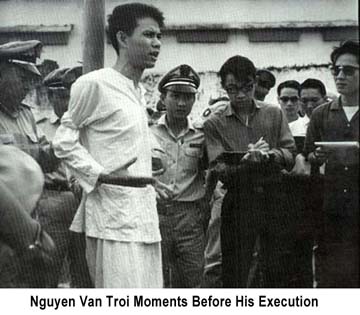
[1971]
Album “Vietnam Will Win!”, Paredon Records.
Traduzione inglese a cura di Barbara Dane della canzone vietnamita interpretata sul disco da tal Nguyen Thu.
Non è che in genere mi piacciano molto le canzoni patriottiche, e non mi metterò certo a trascrivere tutte quelle presenti su questo vecchio disco della Smithsonian Folkways. Anche perché non si tratta degli originali in lingua vietnamita ma delle loro traduzioni in inglese.
Però una, una sola, voglio proporla perché mi consente di raccontare una storia, quella di Nguyen Van Troi.
Nguyen era vietnamita, faceva l’elettricista. Nel 1963, quando gli USA erano già di fatto invischiati nella guerra contro il Nord-Vietnam, Nguyen aveva solo 16 anni. Ora, dalle nostre parti, a quell’età c’era stato chi aveva scelto di stare con i repubblichini fascisti e i nazisti invasori, ma anche chi, come Il comandante Licio, aveva diversamente deciso... (Continues)
Album “Vietnam Will Win!”, Paredon Records.
Traduzione inglese a cura di Barbara Dane della canzone vietnamita interpretata sul disco da tal Nguyen Thu.
Non è che in genere mi piacciano molto le canzoni patriottiche, e non mi metterò certo a trascrivere tutte quelle presenti su questo vecchio disco della Smithsonian Folkways. Anche perché non si tratta degli originali in lingua vietnamita ma delle loro traduzioni in inglese.
Però una, una sola, voglio proporla perché mi consente di raccontare una storia, quella di Nguyen Van Troi.
Nguyen era vietnamita, faceva l’elettricista. Nel 1963, quando gli USA erano già di fatto invischiati nella guerra contro il Nord-Vietnam, Nguyen aveva solo 16 anni. Ora, dalle nostre parti, a quell’età c’era stato chi aveva scelto di stare con i repubblichini fascisti e i nazisti invasori, ma anche chi, come Il comandante Licio, aveva diversamente deciso... (Continues)
Troi, unconquerable hero!
(Continues)
(Continues)
Contributed by The Lone Ranger 2010/7/29 - 11:38
Song Itineraries:
Death penalty: murder by the power, War in Viet Nam: as seen from Viet Nam
El ejemplo de Vietnam
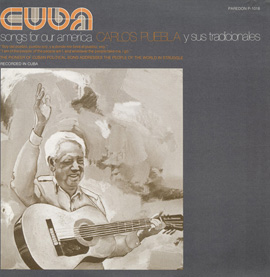
[1975]
Album “Cuba: Songs for Our America”, Paredon Records.
Carlos Puebla y Los Tradicionales
Prodotto da Barbara Dane.
Album “Cuba: Songs for Our America”, Paredon Records.
Carlos Puebla y Los Tradicionales
Prodotto da Barbara Dane.
Puerto Rico
(Continues)
(Continues)
Contributed by Alessandro 2010/4/12 - 11:16
Guajira por Lolita Lebrón
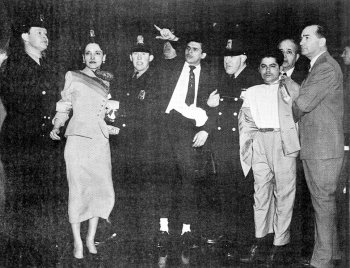
[1975]
Album “Cuba: Songs for Our America”, Paredon Records.
Carlos Puebla y Los Tradicionales
Prodotto da Barbara Dane.
Washington, 1 marzo 1954: Lolita Lebrón e i congiurati portoricani vengono arrestati dalla polizia statunitense.
Nel marzo del 1917, dopo 20 anni di occupazione militare, gli USA concessero la cittadinanza statunitense ai portoricani. Non lo fecero per altruismo, ma perché servivano uomini da spedire in guerra in Europa… Fu proprio nell’anniversario di quella “gentile concessione” che nel 1954 un gruppo di militanti indipendentisti portoricani pianificò un attentato da portarsi al cuore dell’occupante, alla Camera dei Rappresentanti a Washington. Già nel 1950, in occasione del’insurrezione nazionalista nota come “Grito de Jayuya”, gli “irriconoscenti” portoricani avevano cercato invano di uccidere il presidente Truman, sempre a Washington. E pure nel 1954 il commando,... (Continues)
Album “Cuba: Songs for Our America”, Paredon Records.
Carlos Puebla y Los Tradicionales
Prodotto da Barbara Dane.
Washington, 1 marzo 1954: Lolita Lebrón e i congiurati portoricani vengono arrestati dalla polizia statunitense.
Nel marzo del 1917, dopo 20 anni di occupazione militare, gli USA concessero la cittadinanza statunitense ai portoricani. Non lo fecero per altruismo, ma perché servivano uomini da spedire in guerra in Europa… Fu proprio nell’anniversario di quella “gentile concessione” che nel 1954 un gruppo di militanti indipendentisti portoricani pianificò un attentato da portarsi al cuore dell’occupante, alla Camera dei Rappresentanti a Washington. Già nel 1950, in occasione del’insurrezione nazionalista nota come “Grito de Jayuya”, gli “irriconoscenti” portoricani avevano cercato invano di uccidere il presidente Truman, sempre a Washington. E pure nel 1954 il commando,... (Continues)
Lolita Lebrón,
(Continues)
(Continues)
Contributed by Alessandro 2010/4/12 - 10:34
Y está despertando el negro

[1975]
Album “Cuba: Songs for Our America”, Paredon Records.
Carlos Puebla y Los Tradicionales
Prodotto da Barbara Dane.
“This song was written during the civil rights struggles of the '60s, and to applaud black participation in draft resistance. Puebla knows about the infamous remark that "the only good nigger is a dead nigger" and expresses a bitter reaction in verse 4.”
(nota introduttiva al brano dal libretto che accompagna il disco)
Album “Cuba: Songs for Our America”, Paredon Records.
Carlos Puebla y Los Tradicionales
Prodotto da Barbara Dane.
“This song was written during the civil rights struggles of the '60s, and to applaud black participation in draft resistance. Puebla knows about the infamous remark that "the only good nigger is a dead nigger" and expresses a bitter reaction in verse 4.”
(nota introduttiva al brano dal libretto che accompagna il disco)
Y el negro está despertando,
(Continues)
(Continues)
Contributed by Alessandro 2010/4/9 - 11:48
El pobre y el rico
Traduzione inglese da “Cancion Protesta: Protest Songs of Latin America”, a cura di Barbara Dane, Paredon Records, 1970.
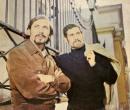
THE POOR AND THE RICH
(Continues)
(Continues)
Contributed by Alessandro 2010/3/17 - 14:13
Canción para mi América
Versione inglese di Barbara Dane da “Cancion Protesta: Protest Songs of Latin America”, Paredon Records, 1970.
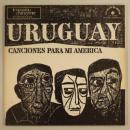
GIVE YOUR HAND TO THE INDIAN
(Continues)
(Continues)
Contributed by Alessandro 2010/3/17 - 13:43
The Kent State Massacre
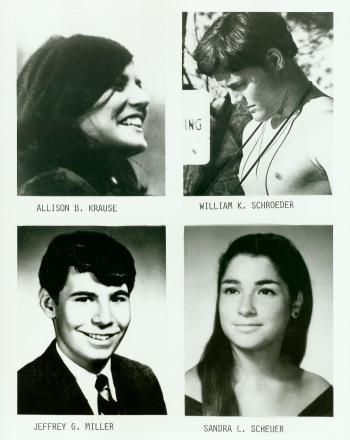
[1970]
Words by Jack Warshaw and Barbara Dane.
Melody from The Death of Harry Simms (Aunt Molly Jackson).
Album “I Hate the Capitalist System”,
Paredon Records, 1973.
“The capitalist system, since its earliest days when little children were employed in the mills and sweatshops, has destroyed its young. In recent times it has demonstrated that it will not tolerate the most modest challenge to its power by murdering students during peaceful demonstrations on campuses.
There is a direct line of continuity from the murders at Orangeburg of Sam Hammon, 18, Delano Middleton, 17, and Henry Smith, 18, to the murders at Jackson State in Mississippi of Phillip Gibbs, 19 and James Green, 17, to the murders at Kent State, Ohio.
The line continues to the needless victimization of hundreds of thousands of their generation who were sent away to fight and die or come home maimed in body or spirit,... (Continues)
Words by Jack Warshaw and Barbara Dane.
Melody from The Death of Harry Simms (Aunt Molly Jackson).
Album “I Hate the Capitalist System”,
Paredon Records, 1973.
“The capitalist system, since its earliest days when little children were employed in the mills and sweatshops, has destroyed its young. In recent times it has demonstrated that it will not tolerate the most modest challenge to its power by murdering students during peaceful demonstrations on campuses.
There is a direct line of continuity from the murders at Orangeburg of Sam Hammon, 18, Delano Middleton, 17, and Henry Smith, 18, to the murders at Jackson State in Mississippi of Phillip Gibbs, 19 and James Green, 17, to the murders at Kent State, Ohio.
The line continues to the needless victimization of hundreds of thousands of their generation who were sent away to fight and die or come home maimed in body or spirit,... (Continues)
Brothers, listen to my story,
(Continues)
(Continues)
Contributed by Alessandro 2010/3/17 - 13:04
Song Itineraries:
War in Viet Nam: Student Protest and Repression
Song Of The Coats
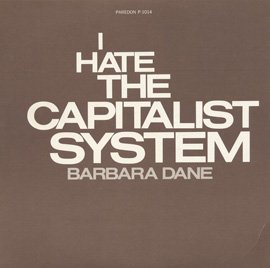
[1968]
Original music and words in vietnamese by Xuan Hong, Việt cộng fighter in southern Vietnam.
English words by Barbara Dane.
Dall’album “I Hate the Capitalist System”, Paredon Records, 1973.
“Written in the southern part of Vietnam in the early '60s, this song was printed in a little pocket songbook carried by the NLF fighters [ossia il Việt cộng] as one of their first gifts to people in the newly liberated villages. It celebrates the dedication of the people working in the little jungle workshops even under the constant threat of bombings and strafings to supply the needs of the fighters. I have had the privilege of singing it in Paris at the giant Tet celebration held in 1972 by the Vietnamese community there, in this English version, and while doing volunteer work with a group of Vietnamese women on a large farm in Cuba when I only knew how to sing the melody without words. Both... (Continues)
Original music and words in vietnamese by Xuan Hong, Việt cộng fighter in southern Vietnam.
English words by Barbara Dane.
Dall’album “I Hate the Capitalist System”, Paredon Records, 1973.
“Written in the southern part of Vietnam in the early '60s, this song was printed in a little pocket songbook carried by the NLF fighters [ossia il Việt cộng] as one of their first gifts to people in the newly liberated villages. It celebrates the dedication of the people working in the little jungle workshops even under the constant threat of bombings and strafings to supply the needs of the fighters. I have had the privilege of singing it in Paris at the giant Tet celebration held in 1972 by the Vietnamese community there, in this English version, and while doing volunteer work with a group of Vietnamese women on a large farm in Cuba when I only knew how to sing the melody without words. Both... (Continues)
Brothers brave the rain and sun,
(Continues)
(Continues)
Contributed by Alessandro 2010/3/17 - 11:54
Song Itineraries:
War in Viet Nam: as seen from Viet Nam
Lonesome Jailhouse Blues

[193?]
Scritta da Olen Montgomery.
Dall’album “I Hate the Capitalist System”, Paredon Records, 1973.
25 marzo 1931, sulla linea ferroviaria tra Chattanooga e Memphis, Tennessee.
C’è un sacco di gente su quel treno, tantissimi giovani e meno giovani, bianchi e neri, senza un soldo in tasca, che si spostano come “hobos” alla ricerca di qualche lavoro stagionale, come nei campi di cotone a Chattanooga… Su uno dei vagoni scoppia una rissa tra neri e bianchi… i secondi hanno la peggio, saltano giù dal treno e raccontano l’accaduto ad un capo-stazione che avverte lo sceriffo… Intanto sul vagone sono rimasti nove giovani neri e due ragazze bianche… Quando lo sceriffo di Paint Rock, Alabama, li ferma, queste due, per paura di essere arrestate per vagabondaggio, raccontano di essere state sequestrate e ripetutamente stuprate dai ragazzi neri, tutti tra i 13 e i 19 anni.
Siamo nel profondo sud... (Continues)
Scritta da Olen Montgomery.
Dall’album “I Hate the Capitalist System”, Paredon Records, 1973.
25 marzo 1931, sulla linea ferroviaria tra Chattanooga e Memphis, Tennessee.
C’è un sacco di gente su quel treno, tantissimi giovani e meno giovani, bianchi e neri, senza un soldo in tasca, che si spostano come “hobos” alla ricerca di qualche lavoro stagionale, come nei campi di cotone a Chattanooga… Su uno dei vagoni scoppia una rissa tra neri e bianchi… i secondi hanno la peggio, saltano giù dal treno e raccontano l’accaduto ad un capo-stazione che avverte lo sceriffo… Intanto sul vagone sono rimasti nove giovani neri e due ragazze bianche… Quando lo sceriffo di Paint Rock, Alabama, li ferma, queste due, per paura di essere arrestate per vagabondaggio, raccontano di essere state sequestrate e ripetutamente stuprate dai ragazzi neri, tutti tra i 13 e i 19 anni.
Siamo nel profondo sud... (Continues)
All night long I sat in my cell and cried
(Continues)
(Continues)
Contributed by Alessandro 2010/3/16 - 15:08
Song Itineraries:
From World Jails, Racism and Slavery in the USA
I Hate the Capitalist System
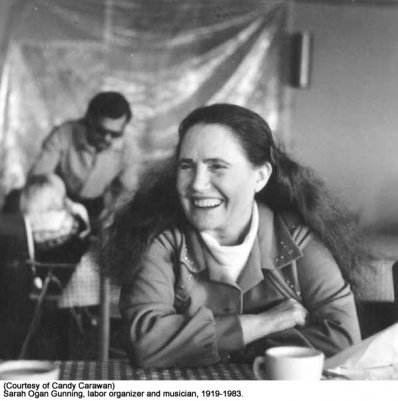
[193?]
Parole e musica di Sarah Ogan Gunning, sorellastra di Aunt Molly Jackson.
Dall’album “Girl of Constant Sorrow”, Folk Legacy Records, 1965.
Riproposta da Barbara Dane nell’album “I Hate the Capitalist System”, Paredon Records, 1973.
“Dedication. This recording is respectfully dedicated to the millions of hard-working people who really made America great, in the sure knowledge that one day they will gather up their strength, their courage and their wisdom, and they will come together to smash this decayed and dying system. They will use their inventiveness and industry to raise all our people to a decent living standard, and restore us to a place of respect among the fellowship of nations. They are the creators of history, and they will construct the socialist future.
Specifically, I want to dedicate these songs to my sister , Julia, who has recently entered that great school... (Continues)
Parole e musica di Sarah Ogan Gunning, sorellastra di Aunt Molly Jackson.
Dall’album “Girl of Constant Sorrow”, Folk Legacy Records, 1965.
Riproposta da Barbara Dane nell’album “I Hate the Capitalist System”, Paredon Records, 1973.
“Dedication. This recording is respectfully dedicated to the millions of hard-working people who really made America great, in the sure knowledge that one day they will gather up their strength, their courage and their wisdom, and they will come together to smash this decayed and dying system. They will use their inventiveness and industry to raise all our people to a decent living standard, and restore us to a place of respect among the fellowship of nations. They are the creators of history, and they will construct the socialist future.
Specifically, I want to dedicate these songs to my sister , Julia, who has recently entered that great school... (Continues)
I hate the capitalist system,
(Continues)
(Continues)
Contributed by Alessandro 2010/3/16 - 13:35
Song Itineraries:
The War of Labour: Emigration, Immigration, Exploitation, Slavery
Last Drink With Don
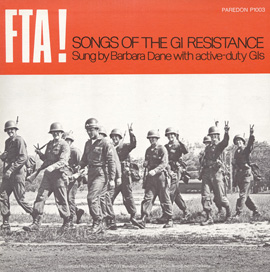
[1970]
Words by Fred Gardner
Music by Barbara Dane
Album “F.T.A.! Songs et the GI Resistance”, Paredon Records
Sung by Barbara Dane with active-duty GIs.
Recorded at Fort Hood, Texas, Fort Benning, Georgia and Fort Bragg, North Carolina.
Edited by Irwin Silber.
“Probably we should have recorded this song with some electric instruments and lots of echo and things, to make it easier to reach out for it from the electronic fantasy world of today‘s records. But I have a personal crusade going to bring back the sound of the human voice. Unretouched, spliced, or vibed up. It's one small battle I fight on the side, probably growing out of the fact that so many times when it's important to go ahead and sing something that will help to change, teach, heal, or move people there just isn't any mike or stage. So even when you're exhausted from marching and rallying, and speaking and travelling,... (Continues)
Words by Fred Gardner
Music by Barbara Dane
Album “F.T.A.! Songs et the GI Resistance”, Paredon Records
Sung by Barbara Dane with active-duty GIs.
Recorded at Fort Hood, Texas, Fort Benning, Georgia and Fort Bragg, North Carolina.
Edited by Irwin Silber.
“Probably we should have recorded this song with some electric instruments and lots of echo and things, to make it easier to reach out for it from the electronic fantasy world of today‘s records. But I have a personal crusade going to bring back the sound of the human voice. Unretouched, spliced, or vibed up. It's one small battle I fight on the side, probably growing out of the fact that so many times when it's important to go ahead and sing something that will help to change, teach, heal, or move people there just isn't any mike or stage. So even when you're exhausted from marching and rallying, and speaking and travelling,... (Continues)
Here's to the butterfly in the tropics of Tonkin,
(Continues)
(Continues)
Contributed by Alessandro 2010/3/16 - 11:48
Insubordination

[1970]
Album “F.T.A.! Songs et the GI Resistance”, Paredon Records
Sung by Barbara Dane with active-duty GIs.
Recorded at Fort Hood, Texas, Fort Benning, Georgia and Fort Bragg, North Carolina.
Edited by Irwin Silber.
“How do you spread your ideas when the radio, the television, the newspapers, the schools, and even the streetcorners seem to be controlled by the people who are controlling you? Start an Alternate U., or a guerrilla theatre, or make up chants that can be easily remembered and passed on.
The best music, in a real functional sense, has always been made without any instruments, arrangements, or rehearsals. This song has all the room you need for new verses, with the essential couple of anchor points of popular agreement. Nobody ever told me afteward that "Yes, I do want somebody over me (or under me), so I won't sing that."
(Nota introduttiva al brano dal libretto che accompagna l’album citato)
Album “F.T.A.! Songs et the GI Resistance”, Paredon Records
Sung by Barbara Dane with active-duty GIs.
Recorded at Fort Hood, Texas, Fort Benning, Georgia and Fort Bragg, North Carolina.
Edited by Irwin Silber.
“How do you spread your ideas when the radio, the television, the newspapers, the schools, and even the streetcorners seem to be controlled by the people who are controlling you? Start an Alternate U., or a guerrilla theatre, or make up chants that can be easily remembered and passed on.
The best music, in a real functional sense, has always been made without any instruments, arrangements, or rehearsals. This song has all the room you need for new verses, with the essential couple of anchor points of popular agreement. Nobody ever told me afteward that "Yes, I do want somebody over me (or under me), so I won't sing that."
(Nota introduttiva al brano dal libretto che accompagna l’album citato)
I know I'm guilty, and I'm proud,
(Continues)
(Continues)
Contributed by Alessandro 2010/3/16 - 11:18
Song Itineraries:
War in Viet Nam as seen from the U.S.
The Resistance Hymn

[1970]
Tune: “Patriot Game”
Words: adopted by Barbara Dane from "The Hallo People"
Album “F.T.A.! Songs et the GI Resistance”, Paredon Records
Sung by Barbara Dane with active-duty GIs.
Recorded at Fort Hood, Texas, Fort Benning, Georgia and Fort Bragg, North Carolina.
Edited by Irwin Silber.
“This song was made up for draft resisters, and that's how it got its name. But since then, a whole blossoming movement of resisters inside the Army has come to light, and this song has served there too. I'll never forget the night I was teaching it to a meeting of sailors and marines in San Diego, who were organizing a new branch of the Movement for a Democratic Military, early in 1970. Inside the little store-front meeting place, I was telling the guys not to sing the part in the chorus wrong where it says "I've got something I’ll die for, what else can they do." It's drummed into people's heads... (Continues)
Tune: “Patriot Game”
Words: adopted by Barbara Dane from "The Hallo People"
Album “F.T.A.! Songs et the GI Resistance”, Paredon Records
Sung by Barbara Dane with active-duty GIs.
Recorded at Fort Hood, Texas, Fort Benning, Georgia and Fort Bragg, North Carolina.
Edited by Irwin Silber.
“This song was made up for draft resisters, and that's how it got its name. But since then, a whole blossoming movement of resisters inside the Army has come to light, and this song has served there too. I'll never forget the night I was teaching it to a meeting of sailors and marines in San Diego, who were organizing a new branch of the Movement for a Democratic Military, early in 1970. Inside the little store-front meeting place, I was telling the guys not to sing the part in the chorus wrong where it says "I've got something I’ll die for, what else can they do." It's drummed into people's heads... (Continues)
They say I was born in the lend of the free.
(Continues)
(Continues)
Contributed by Alessandro 2010/3/16 - 11:07
We Shall Not Be Moved
Anonymous
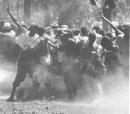
Sung by Barbara Dane with active-duty GIs.
Recorded at Fort Hood, Texas, Fort Benning, Georgia and Fort Bragg, North Carolina.
Edited by Irwin Silber.
Come spiega qui la stessa Barbara Dane, si tratta di una versione che raccoglie insieme strofe usate come slogan nel corso di diverse manifestazioni di protesta in diverse parti del mondo… Il riferimento ad Henry Ford fa pensare alle proteste americane contro il complesso militare-industriale durante la guerra in Vienam; “Polaris” era il nome di un missile balistico nucleare americano usato a partire dagli anni 60 dalla U.S Navy, successivamente anche dalla Royal Navy britannica… qualcuno arrivò pure da noi per essere montato sulla fregata Giuseppe Garibaldi, ma la cosa non ebbe seguito (anche se qualcuno di quei Polaris ancora se ne sta nell’Arsenale a La Spezia..); la strofa in italiano rimanda alle nostrane proteste ben descritte in Le... (Continues)
Recorded at Fort Hood, Texas, Fort Benning, Georgia and Fort Bragg, North Carolina.
Edited by Irwin Silber.
Come spiega qui la stessa Barbara Dane, si tratta di una versione che raccoglie insieme strofe usate come slogan nel corso di diverse manifestazioni di protesta in diverse parti del mondo… Il riferimento ad Henry Ford fa pensare alle proteste americane contro il complesso militare-industriale durante la guerra in Vienam; “Polaris” era il nome di un missile balistico nucleare americano usato a partire dagli anni 60 dalla U.S Navy, successivamente anche dalla Royal Navy britannica… qualcuno arrivò pure da noi per essere montato sulla fregata Giuseppe Garibaldi, ma la cosa non ebbe seguito (anche se qualcuno di quei Polaris ancora se ne sta nell’Arsenale a La Spezia..); la strofa in italiano rimanda alle nostrane proteste ben descritte in Le... (Continues)
WE SHALL NOT BE MOVED
(Continues)
(Continues)
Contributed by Alessandro 2010/3/16 - 10:25
Just Another Day
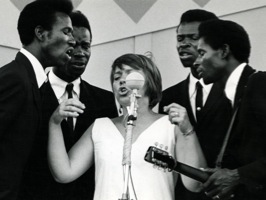
[1970]
Words and music by Bill Frederick, student in chemistry and draft resister at the time of the Vietnam War.
Album “F.T.A.! Songs et the GI Resistance”, Paredon Records
Sung by Barbara Dane with active-duty GIs.
Recorded at Fort Hood, Texas, Fort Benning, Georgia and Fort Bragg, North Carolina.
Edited by Irwin Silber.
“The writer of this song is a draft resister, an advanced student in chemistry, and one of the first songwriters to express a genuine sensitivity to the situation of the Vietnamese in the late '60s. Most of us have had so much conditioning the other way that when I sing this song people are very conflicted about how to respond. GIs will clap rather self-consciously, and one room full of atomic-energy scientists couldn't clap at all. I wish we had a better-recorded version of such a good song, but since all of us who worked on the album are activists, we were all... (Continues)
Words and music by Bill Frederick, student in chemistry and draft resister at the time of the Vietnam War.
Album “F.T.A.! Songs et the GI Resistance”, Paredon Records
Sung by Barbara Dane with active-duty GIs.
Recorded at Fort Hood, Texas, Fort Benning, Georgia and Fort Bragg, North Carolina.
Edited by Irwin Silber.
“The writer of this song is a draft resister, an advanced student in chemistry, and one of the first songwriters to express a genuine sensitivity to the situation of the Vietnamese in the late '60s. Most of us have had so much conditioning the other way that when I sing this song people are very conflicted about how to respond. GIs will clap rather self-consciously, and one room full of atomic-energy scientists couldn't clap at all. I wish we had a better-recorded version of such a good song, but since all of us who worked on the album are activists, we were all... (Continues)
There is a little haze in the morning air.
(Continues)
(Continues)
Contributed by Alessandro 2010/3/16 - 09:20
Song Itineraries:
War in Viet Nam as seen from the U.S.
Join the GI Movement

[1970]
Words by Barbara Dane
Based on Aunt Molly Jackson' "I Am a Union Woman" (1931)
Album “F.T.A.! Songs et the GI Resistance”, Paredon Records
Sung by Barbara Dane with active-duty GIs.
Recorded at Fort Hood, Texas, Fort Benning, Georgia and Fort Bragg, North Carolina.
Edited by Irwin Silber.
“Back in the early '30s a great singing organizer in the bloody mine battles was Aunt Molly Jackson. She was the sister of two other great people's singers and fighters, Jim Garland and Sarah Ogan Gunning. The whole family was blacklisted from work because of their union activities, and they finally had to move away from Harlan County just to live. But their legacy of songs has stayed with us and keeps on being useful, wherever people are finding the strength and courage to fight for their rights. It seemed to me that this old chorus which used to be "Join the CIO" would help the guys who... (Continues)
Words by Barbara Dane
Based on Aunt Molly Jackson' "I Am a Union Woman" (1931)
Album “F.T.A.! Songs et the GI Resistance”, Paredon Records
Sung by Barbara Dane with active-duty GIs.
Recorded at Fort Hood, Texas, Fort Benning, Georgia and Fort Bragg, North Carolina.
Edited by Irwin Silber.
“Back in the early '30s a great singing organizer in the bloody mine battles was Aunt Molly Jackson. She was the sister of two other great people's singers and fighters, Jim Garland and Sarah Ogan Gunning. The whole family was blacklisted from work because of their union activities, and they finally had to move away from Harlan County just to live. But their legacy of songs has stayed with us and keeps on being useful, wherever people are finding the strength and courage to fight for their rights. It seemed to me that this old chorus which used to be "Join the CIO" would help the guys who... (Continues)
I am a GI rebel,
(Continues)
(Continues)
Contributed by Alessandro 2010/3/15 - 13:53
Rumo a Independênćia
Anonymous
[1978]
Album “Angola: Forward, People's Power”, Paredon Records.
Prodotto da Barbara Dane
Tutte le canzoni di questo album furono registrate alla stazione della radio nazionale angolana in Luanda da cantanti e musicisti rimasti anonimi.
Il punto di vista rispetto alla guerra civile che era già in corso al momento (e si sarebbe protratta per un altro quarto di secolo) è quello dell’organizzazione di ispirazione marxista-leninista MPLA.
Per una stringata introduzione alla storia dell’indipendenza e della guerra civile angolana, vedi Invasores de Angola.
L'11 novembre 1975 il MPLA dichiarò l'indipendenza del paese, riconosciuta dal Portogallo.
Album “Angola: Forward, People's Power”, Paredon Records.
Prodotto da Barbara Dane
Tutte le canzoni di questo album furono registrate alla stazione della radio nazionale angolana in Luanda da cantanti e musicisti rimasti anonimi.
Il punto di vista rispetto alla guerra civile che era già in corso al momento (e si sarebbe protratta per un altro quarto di secolo) è quello dell’organizzazione di ispirazione marxista-leninista MPLA.
Per una stringata introduzione alla storia dell’indipendenza e della guerra civile angolana, vedi Invasores de Angola.
L'11 novembre 1975 il MPLA dichiarò l'indipendenza del paese, riconosciuta dal Portogallo.
Agora já é hora,
(Continues)
(Continues)
Contributed by Alessandro 2010/3/10 - 14:09
Noite Longa
Anonymous
[1978]
Album “Angola: Forward, People's Power”, Paredon Records.
Prodotto da Barbara Dane
Tutte le canzoni di questo album furono registrate alla stazione delle radio nazionale angolana in Luanda da cantanti e musicisti rimasti anonimi.
Il punto di vista rispetto alla guerra civile che era già in corso al momento (e si sarebbe protratta per un altro quarto di secolo) è quello dell’organizzazione di ispirazione marxista-leninista MPLA.
Per una stringata introduzione alla storia dell’indipendenza e della guerra civile angolana, vedi Invasores de Angola.
La canzone racconta del tradimento delle lotta per l’indipendenza da parte di coloro che dopo il 1974 si fecero carnefici del loro stesso popolo che tanto aveva già sofferto sotto la dominazione portoghese: “Morto il colonialismo, subito dal nulla sorgerrano falsi eroi che sosterranno che tutti hanno lottato, che tutti hanno sofferto…... (Continues)
Album “Angola: Forward, People's Power”, Paredon Records.
Prodotto da Barbara Dane
Tutte le canzoni di questo album furono registrate alla stazione delle radio nazionale angolana in Luanda da cantanti e musicisti rimasti anonimi.
Il punto di vista rispetto alla guerra civile che era già in corso al momento (e si sarebbe protratta per un altro quarto di secolo) è quello dell’organizzazione di ispirazione marxista-leninista MPLA.
Per una stringata introduzione alla storia dell’indipendenza e della guerra civile angolana, vedi Invasores de Angola.
La canzone racconta del tradimento delle lotta per l’indipendenza da parte di coloro che dopo il 1974 si fecero carnefici del loro stesso popolo che tanto aveva già sofferto sotto la dominazione portoghese: “Morto il colonialismo, subito dal nulla sorgerrano falsi eroi che sosterranno che tutti hanno lottato, che tutti hanno sofferto…... (Continues)
Noite longa passamos,
(Continues)
(Continues)
Contributed by Alessandro 2010/3/10 - 13:48
Estrangeiro
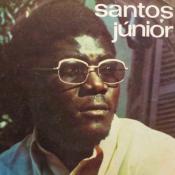
[1978]
Album “Angola: Forward, People's Power”, Paredon Records.
Prodotto da Barbara Dane
Tutte le canzoni di questo album furono registrate alla stazione delle radio nazionale angolana in Luanda da cantanti e musicisti rimasti anonimi.
Il punto di vista rispetto alla guerra civile che era già in corso al momento (e si sarebbe protratta per un altro quarto di secolo) è quello dell’organizzazione di ispirazione marxista-leninista MPLA.
Per una stringata introduzione alla storia dell’indipendenza e della guerra civile angolana, vedi Invasores de Angola.
“Estrangeiro/Foreigner” si riferisce alla popolazione bianca o meticcia angolana, i discendenti degli antichi dominatori portoghesi che ancora oggi sono il 2% della popolazione, quasi totalmente composta da neri di etnia bantù kikongo.
Album “Angola: Forward, People's Power”, Paredon Records.
Prodotto da Barbara Dane
Tutte le canzoni di questo album furono registrate alla stazione delle radio nazionale angolana in Luanda da cantanti e musicisti rimasti anonimi.
Il punto di vista rispetto alla guerra civile che era già in corso al momento (e si sarebbe protratta per un altro quarto di secolo) è quello dell’organizzazione di ispirazione marxista-leninista MPLA.
Per una stringata introduzione alla storia dell’indipendenza e della guerra civile angolana, vedi Invasores de Angola.
“Estrangeiro/Foreigner” si riferisce alla popolazione bianca o meticcia angolana, i discendenti degli antichi dominatori portoghesi che ancora oggi sono il 2% della popolazione, quasi totalmente composta da neri di etnia bantù kikongo.
Estrangeiro,
(Continues)
(Continues)
Contributed by Alessandro 2010/3/10 - 12:50
Mãe Angola
Anonymous
[1978]
Album “Angola: Forward, People's Power”, Paredon Records.
Prodotto da Barbara Dane
Tutte le canzoni di questo album furono registrate alla stazione delle radio nazionale angolana in Luanda da cantanti e musicisti rimasti anonimi.
Il punto di vista rispetto alla guerra civile che era già in corso al momento (e si sarebbe protratta per un altro quarto di secolo) è quello dell’organizzazione di ispirazione marxista-leninista MPLA.
Per una stringata introduzione alla storia dell’indipendenza e della guerra civile angolana, vedi Invasores de Angola.
Album “Angola: Forward, People's Power”, Paredon Records.
Prodotto da Barbara Dane
Tutte le canzoni di questo album furono registrate alla stazione delle radio nazionale angolana in Luanda da cantanti e musicisti rimasti anonimi.
Il punto di vista rispetto alla guerra civile che era già in corso al momento (e si sarebbe protratta per un altro quarto di secolo) è quello dell’organizzazione di ispirazione marxista-leninista MPLA.
Per una stringata introduzione alla storia dell’indipendenza e della guerra civile angolana, vedi Invasores de Angola.
Ai, mãe Angola,
(Continues)
(Continues)
Contributed by Alessandro 2010/3/10 - 11:48
Invasores de Angola
Anonymous
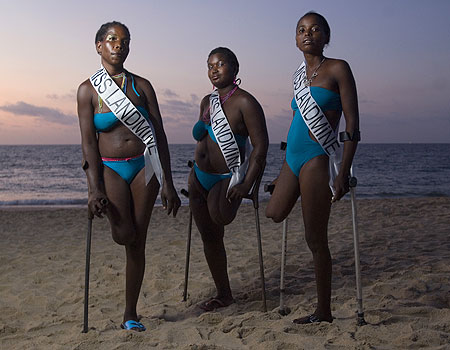
[1978]
Album “Angola: Forward, People's Power”, Paredon Records.
Prodotto da Barbara Dane
Tutte le canzoni di questo album furono registrate alla stazione delle radio nazionale angolana in Luanda da cantanti e musicisti rimasti anonimi.
Il punto di vista rispetto alla guerra civile che era già in corso al momento (e si sarebbe protratta per un altro quarto di secolo) è quello dell’organizzazione di ispirazione marxista-leninista MPLA.
L’Angola cominciò ad essere meta di commercianti ed avventurieri portoghesi già parecchio tempo prima della “scoperta delle Americhe”. Nel XVII secolo la colonizzazione vera e propria era compiuta, anche grazie all’allenza tra gli europei e la tribù più forte e bellicosa presente sul territorio angolano, gli Imbangala, la cui attività principale era soggiogare le altre etnie e venderne i prigionieri come schiavi ai portoghesi… Il collaborazionismo è una... (Continues)
Album “Angola: Forward, People's Power”, Paredon Records.
Prodotto da Barbara Dane
Tutte le canzoni di questo album furono registrate alla stazione delle radio nazionale angolana in Luanda da cantanti e musicisti rimasti anonimi.
Il punto di vista rispetto alla guerra civile che era già in corso al momento (e si sarebbe protratta per un altro quarto di secolo) è quello dell’organizzazione di ispirazione marxista-leninista MPLA.
L’Angola cominciò ad essere meta di commercianti ed avventurieri portoghesi già parecchio tempo prima della “scoperta delle Americhe”. Nel XVII secolo la colonizzazione vera e propria era compiuta, anche grazie all’allenza tra gli europei e la tribù più forte e bellicosa presente sul territorio angolano, gli Imbangala, la cui attività principale era soggiogare le altre etnie e venderne i prigionieri come schiavi ai portoghesi… Il collaborazionismo è una... (Continues)
Norte-Americanos
(Continues)
(Continues)
Contributed by Alessandro 2010/3/10 - 09:32
Free the Land
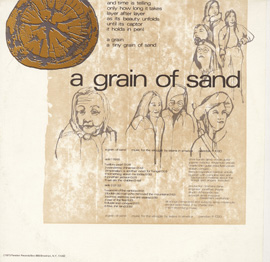
[1973]
Album “A Grain of Sand: Music for the Struggle by Asians in America”, Paredon Records.
Con Chris Kando Iijima, Joanne Nobuko Miyamoto e "Charlie" Chin.
Prodotto da Barbara Dane
“This song was written for a friend, sister Ibidun, and for a nation, the Republic of New Africa.
They say "free the land," as it captures a key concept in their struggle: land and sovereignty for blacks within the U.S. But we see this phrase as significant for all people who have worked and struggled in, and been oppressed by, this country. The land must be freed so that those who live and work on it will live in freedom. We will win! In the name of Malcolm, free the land…”
[nota introduttiva al brano dal libretto che accompagna l’album]
Diversamente da quanto può apparire dall’introduzione, questa canzone non è dedicata alla lotta dei neri sudafricani contro l’apartheid ma alla Republic of New Afrika... (Continues)
Album “A Grain of Sand: Music for the Struggle by Asians in America”, Paredon Records.
Con Chris Kando Iijima, Joanne Nobuko Miyamoto e "Charlie" Chin.
Prodotto da Barbara Dane
“This song was written for a friend, sister Ibidun, and for a nation, the Republic of New Africa.
They say "free the land," as it captures a key concept in their struggle: land and sovereignty for blacks within the U.S. But we see this phrase as significant for all people who have worked and struggled in, and been oppressed by, this country. The land must be freed so that those who live and work on it will live in freedom. We will win! In the name of Malcolm, free the land…”
[nota introduttiva al brano dal libretto che accompagna l’album]
Diversamente da quanto può apparire dall’introduzione, questa canzone non è dedicata alla lotta dei neri sudafricani contro l’apartheid ma alla Republic of New Afrika... (Continues)
Free the land
(Continues)
(Continues)
Contributed by Alessandro 2010/3/8 - 13:57
Divide and Conquer

[1973]
Album “A Grain of Sand: Music for the Struggle by Asians in America”, Paredon Records.
Con Chris Kando Iijima, Joanne Nobuko Miyamoto e "Charlie" Chin.
Prodotto da Barbara Dane
“The tactic of dividing the people in order to conquer them is a tactic which capitalism has used in this country very effectively. It has not only kept different races apart, it has kept sexes, religions, ages, occupations, just about everything divided. People have been taught we must compete against one another, and that we threaten each others interests. It has even affected us personally in feelings of alienation from each other and ourselves, so that we are isolated and alone. We are not alone - our interests are the same as all people fighting against the common oppressor. Our struggle for unity is a critical struggle, and it is vital for victory.”
[nota introduttiva al brano dal libretto che accompagna l’album]
Album “A Grain of Sand: Music for the Struggle by Asians in America”, Paredon Records.
Con Chris Kando Iijima, Joanne Nobuko Miyamoto e "Charlie" Chin.
Prodotto da Barbara Dane
“The tactic of dividing the people in order to conquer them is a tactic which capitalism has used in this country very effectively. It has not only kept different races apart, it has kept sexes, religions, ages, occupations, just about everything divided. People have been taught we must compete against one another, and that we threaten each others interests. It has even affected us personally in feelings of alienation from each other and ourselves, so that we are isolated and alone. We are not alone - our interests are the same as all people fighting against the common oppressor. Our struggle for unity is a critical struggle, and it is vital for victory.”
[nota introduttiva al brano dal libretto che accompagna l’album]
Have you ever woken,
(Continues)
(Continues)
Contributed by Alessandro 2010/3/8 - 13:35
War of the Flea

[1973]
Album “A Grain of Sand: Music for the Struggle by Asians in America”, Paredon Records.
Con Chris Kando Iijima, Joanne Nobuko Miyamoto e "Charlie" Chin.
Prodotto da Barbara Dane
Una canzone dedicata alla lotta di liberazione vietnamita.
“People's war has shown that small, oppressed nations can defeat the most highly technological military machine in the world - the U.S. This song is a celebration of that truth and to those who have shown us, in the belly of the monster, that truth.”
[nota introduttiva al brano dal libretto che accompagna l’album]
Album “A Grain of Sand: Music for the Struggle by Asians in America”, Paredon Records.
Con Chris Kando Iijima, Joanne Nobuko Miyamoto e "Charlie" Chin.
Prodotto da Barbara Dane
Una canzone dedicata alla lotta di liberazione vietnamita.
“People's war has shown that small, oppressed nations can defeat the most highly technological military machine in the world - the U.S. This song is a celebration of that truth and to those who have shown us, in the belly of the monster, that truth.”
[nota introduttiva al brano dal libretto che accompagna l’album]
Song of the night,
(Continues)
(Continues)
Contributed by Alessandro 2010/3/8 - 13:27
Warriors Of The Rainbow
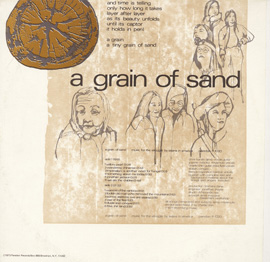
[1973]
Album “A Grain of Sand: Music for the Struggle by Asians in America”, Paredon Records.
Con Chris Kando Iijima, Joanne Nobuko Miyamoto e "Charlie" Chin.
Prodotto da Barbara Dane
“In Chicago in the summer of 1970, we met with some Indian brothers and sisters who were squatting for decent housing for their people. They told us of an old Indian legend (we don‘t know which nation it came from). The legend said that for 5.000 years the world would be ruled by evil followed by 5.000 years of good, that change would be brought about with the coming together of warriors of all colors of the rainbow, and that the time for that change is now…”
[nota introduttiva al brano dal libretto che accompagna l’album]
Quella dei “guerrieri dell’arcobaleno” è una profezia dei nativi americani appartenenti alla nazione Hopi, Arizona, ma leggende simili sono riscontrabili anche tra Cree e Cherokee. Il... (Continues)
Album “A Grain of Sand: Music for the Struggle by Asians in America”, Paredon Records.
Con Chris Kando Iijima, Joanne Nobuko Miyamoto e "Charlie" Chin.
Prodotto da Barbara Dane
“In Chicago in the summer of 1970, we met with some Indian brothers and sisters who were squatting for decent housing for their people. They told us of an old Indian legend (we don‘t know which nation it came from). The legend said that for 5.000 years the world would be ruled by evil followed by 5.000 years of good, that change would be brought about with the coming together of warriors of all colors of the rainbow, and that the time for that change is now…”
[nota introduttiva al brano dal libretto che accompagna l’album]
Quella dei “guerrieri dell’arcobaleno” è una profezia dei nativi americani appartenenti alla nazione Hopi, Arizona, ma leggende simili sono riscontrabili anche tra Cree e Cherokee. Il... (Continues)
Rain storm, winds blow
(Continues)
(Continues)
Contributed by Alessandro 2010/3/8 - 13:17
We Are The Children

[1973]
Album “A Grain of Sand: Music for the Struggle by Asians in America”, Paredon Records.
Con Chris Kando Iijima, Joanne Nobuko Miyamoto e "Charlie" Chin.
Prodotto da Barbara Dane
“This is another another first songs we wrote. It only touched on our people's plight and experiences in this country. We've heard that sisters and brothers in Hawaii and other places have added verses to it. We say right on -- it is your song.”
[nota introduttiva al brano dal libretto che accompagna l’album]
Album “A Grain of Sand: Music for the Struggle by Asians in America”, Paredon Records.
Con Chris Kando Iijima, Joanne Nobuko Miyamoto e "Charlie" Chin.
Prodotto da Barbara Dane
“This is another another first songs we wrote. It only touched on our people's plight and experiences in this country. We've heard that sisters and brothers in Hawaii and other places have added verses to it. We say right on -- it is your song.”
[nota introduttiva al brano dal libretto che accompagna l’album]
We are the children of the migrant worker
(Continues)
(Continues)
Contributed by Alessandro 2010/3/8 - 12:51
Jonathan Jackson

[1973]
Album “A Grain of Sand: Music for the Struggle by Asians in America”, Paredon Records.
Con Chris Kando Iijima, Joanne Nobuko Miyamoto e "Charlie" Chin.
Prodotto da Barbara Dane
“When we hear about revolutionary heroes like Jonathan Jackson (who was shot at San Marin Courthouse trying to free his brother George), we tend to put them into some superhuman category. What we want to say is that Jonathan Jackson, like Nguyen Van Trol, like Che Guevara, was first a human being like us; a human being with feelings, joys, and fears, and that we all have that revolutionary potential. Jonathan Jackson is not separate from us, but part of us and what he stood for, is us.”
[nota introduttiva al brano dal libretto che accompagna l’album]
Sui fratelli Jackson si vedano anche George Jackson e Uncle George.
Album “A Grain of Sand: Music for the Struggle by Asians in America”, Paredon Records.
Con Chris Kando Iijima, Joanne Nobuko Miyamoto e "Charlie" Chin.
Prodotto da Barbara Dane
“When we hear about revolutionary heroes like Jonathan Jackson (who was shot at San Marin Courthouse trying to free his brother George), we tend to put them into some superhuman category. What we want to say is that Jonathan Jackson, like Nguyen Van Trol, like Che Guevara, was first a human being like us; a human being with feelings, joys, and fears, and that we all have that revolutionary potential. Jonathan Jackson is not separate from us, but part of us and what he stood for, is us.”
[nota introduttiva al brano dal libretto che accompagna l’album]
Sui fratelli Jackson si vedano anche George Jackson e Uncle George.
Never met a man who said
(Continues)
(Continues)
Contributed by Alessandro 2010/3/8 - 12:09
Imperialism Is Another Word For Hunger

[1973]
Album “A Grain of Sand: Music for the Struggle by Asians in America”, Paredon Records.
Con Chris Kando Iijima, Joanne Nobuko Miyamoto e "Charlie" Chin.
Prodotto da Barbara Dane
“As the struggle against U.S. imperialism around the world intensifies, our task here is to give the people in America a better understanding and fuller awareness of what U.S. Imperialism is, what it does, and what we must do to combat it. Our purpose in writing “imperialism" was two-fold; One, to help break down the "mystique" of words like imperialism which the governments propaganda has injected into the minds of the people -- to equate imperialism with everyday concepts so people feel more at ease with hearing it and talking about it; two, to help us break down our own dependence on rhetoric so that we may better be able to communicate with those we are trying to serve.
Obviously, that is a tall order... (Continues)
Album “A Grain of Sand: Music for the Struggle by Asians in America”, Paredon Records.
Con Chris Kando Iijima, Joanne Nobuko Miyamoto e "Charlie" Chin.
Prodotto da Barbara Dane
“As the struggle against U.S. imperialism around the world intensifies, our task here is to give the people in America a better understanding and fuller awareness of what U.S. Imperialism is, what it does, and what we must do to combat it. Our purpose in writing “imperialism" was two-fold; One, to help break down the "mystique" of words like imperialism which the governments propaganda has injected into the minds of the people -- to equate imperialism with everyday concepts so people feel more at ease with hearing it and talking about it; two, to help us break down our own dependence on rhetoric so that we may better be able to communicate with those we are trying to serve.
Obviously, that is a tall order... (Continues)
It's just another word for hunger,
(Continues)
(Continues)
Contributed by Alessandro 2010/3/8 - 11:49
Last Train To Nuremberg
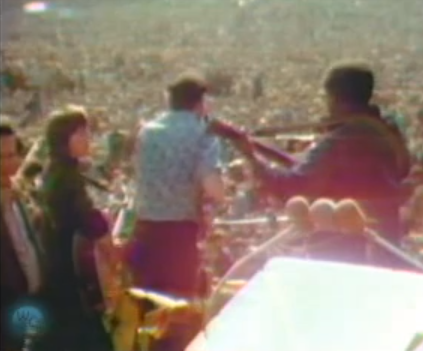
Words and Music by Pete Seeger (1970)
In questa celebre canzone Seeger suggerisce che il tenente Calley, il capitano Medina e il generale Koster, responsabili del massacro di My Lai, dovessero essere processati come i nazisti a Norinberga insieme allo stesso presidente Nixon, alle due camere dei rappresentanti che avevano votato la guerra e infine tutto il popolo americano che con il suo voto aveva legittimato tali crimini.
Iconic American folk singer, Seeger played a key role in the 1950s folk revival and the 1960s anti-war movement. He often wrote political songs, protesting against war, segregation, and calling for environmental protection. Seeger's 1971 anti-war song "Last Train to Nuremberg" (Columbia Records # 4-45398) condemned the My Lai massacre and pointed the finger at several layers of society that had "blood upon" their "hands". Nuremberg refered to the location of the criminal... (Continues)
In questa celebre canzone Seeger suggerisce che il tenente Calley, il capitano Medina e il generale Koster, responsabili del massacro di My Lai, dovessero essere processati come i nazisti a Norinberga insieme allo stesso presidente Nixon, alle due camere dei rappresentanti che avevano votato la guerra e infine tutto il popolo americano che con il suo voto aveva legittimato tali crimini.
Iconic American folk singer, Seeger played a key role in the 1950s folk revival and the 1960s anti-war movement. He often wrote political songs, protesting against war, segregation, and calling for environmental protection. Seeger's 1971 anti-war song "Last Train to Nuremberg" (Columbia Records # 4-45398) condemned the My Lai massacre and pointed the finger at several layers of society that had "blood upon" their "hands". Nuremberg refered to the location of the criminal... (Continues)
Last train to Nuremberg!
(Continues)
(Continues)
2005/10/30 - 17:02
Song Itineraries:
Trains, War in Viet Nam as seen from the U.S.
×
![]()

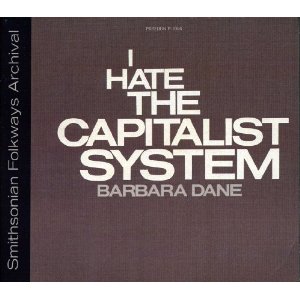
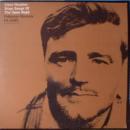
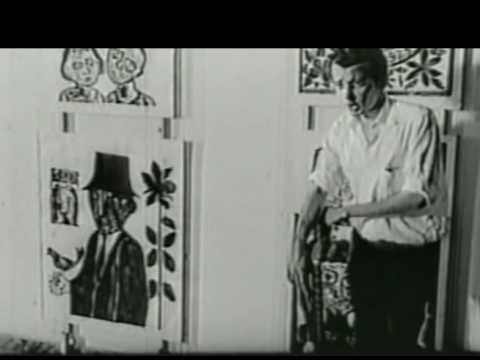
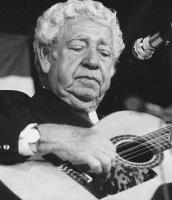

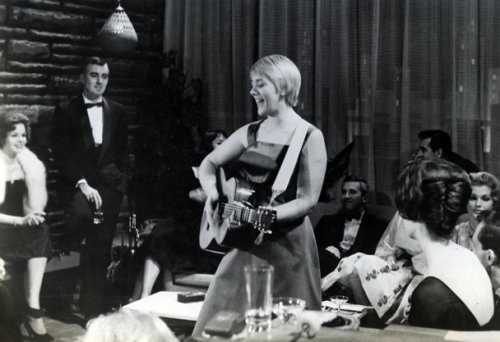
Barbara Dane e Irwin Silber scrissero questo brano a partire dall’omonima folk song di autore anonimo, diffusasi a partire dalla fine dell’800 tra le fila del sindacato Industrial Workers of The World. La melodia era quella della tradizionale "Revive Us Again".
Album “F.T.A.! Songs et the GI Resistance”, Paredon Records
Sung by Barbara Dane with active-duty GIs.
Recorded at Fort Hood, Texas, Fort Benning, Georgia and Fort Bragg, North Carolina.
Edited by Irwin Silber.